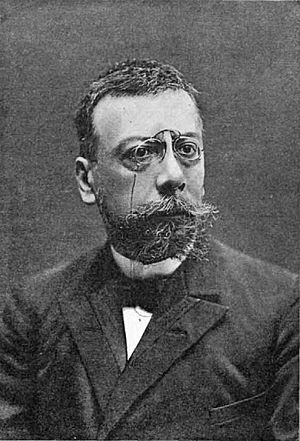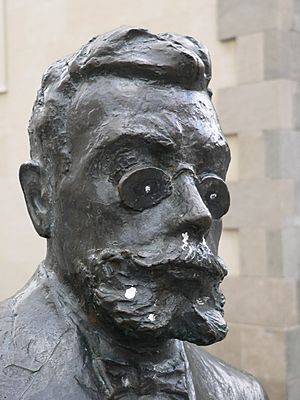Àngel Guimerà facts for kids
Quick facts for kids
Àngel Guimerà
|
|
|---|---|

Guimerà, ca. 1894, by Pau Audouard
|
|
| Born |
Ángel Guimerá y Jorge
6 May 1845 or 6 May 1847 or 1849 Santa Cruz de Tenerife, Canary Islands, Spain
|
| Died | 18 July 1924 Barcelona, Spain
|
| Resting place | Montjuïc Cemetery |
| Nationality | Spanish |
| Occupation | Writer, poet, playwright |
|
Works
|
Terra baixa, La Filla del Mar |
Àngel Guimerà y Jorge (born around 1845-1849, died 1924) was a famous Spanish writer. He wrote in the Catalan language, which is spoken in parts of Spain. He was even nominated for the Nobel Prize in Literature many times!
Guimerà is known for mixing romantic ideas with realistic stories in his plays. He was a very important figure in a movement called the Renaixença (which means "Rebirth") in the late 1800s. This movement helped bring the Catalan language back to life for writing and literature.
Contents
Life of Àngel Guimerà
Àngel Guimerà was born in Santa Cruz de Tenerife, which is in the Canary Islands. His father was from Catalonia, and his mother was from the Canary Islands. When he was young, his family moved to Catalonia. They settled in El Vendrell, his father's hometown.
His Popular Plays
Guimerà wrote many popular plays. These plays were so good that they were translated into other languages. They were even performed in different countries! His work really helped the Catalan language become important again for writers. This was a big part of the Renaixença movement.
His most famous play is a realistic drama called Terra baixa (which means Lowlands). He wrote it in 1896, and it quickly became popular around the world. This play was translated into 15 different languages! In Spain and Latin America, a theater group performed the Spanish version for 30 years. It was even performed on Broadway in New York City three times.
Terra baixa was also made into six movies. One silent film in the United States was called Martha of the Lowlands (1914). Later, a famous director named Leni Riefenstahl made a movie called Tiefland (1954) based on it. The play also inspired two operas: a German one called Tiefland and a French one called La Catalane.
Nobel Prize Nomination
Àngel Guimerà was nominated for the Nobel Prize in Literature 23 times! However, he never won the award. In 1904, he was considered for the prize along with a writer named Frédéric Mistral. They were both recognized for writing in languages that were not official national languages. But due to political reasons, the prize was given to Mistral and another Spanish writer, José Echegaray.
His Passing
When Guimerà passed away in 1924, he had a very large public funeral in Barcelona. It was one of the biggest funerals ever seen there. He was laid to rest in the Montjuïc Cemetery.
In his hometown of Santa Cruz de Tenerife, there is a theater named after him, called the Teatro Guimerá.
Terra baixa (Lowlands)
Terra baixa is a story about a young woman named Marta. She is poor and lives in Barcelona. She becomes involved with Sebastià, who is a very powerful landowner. Sebastià needs to marry a rich woman to keep his land. To stop people from gossiping about him and Marta, he arranges for Marta to marry Manelic. Manelic is a young shepherd from the mountains who doesn't know about Sebastià and Marta's past.
Sebastià sets up Marta and Manelic in a house next to the town's mill. Marta feels torn between Sebastià, who used to control her, and Manelic, her kind new husband.
La filla del mar (The Daughter of the Sea)
Another well-known play by Guimerà is La filla del mar (1900). This play tells the story of a girl named Àgata.
Àgata's name means "agate," which is a beautiful stone. But people treat her badly. She was born in a place they called "among Moors," and because of her unclear background, people hate her. They even call her a "heretic."
Only a few people are kind to her, like Baltasanet, who says, "When we are born, we are all Moors." Àgata knows that people see her as a "nobody" and a "nuisance." She often asks, "What bad thing have I done, that everyone despises me?" The unfair treatment she faces eventually leads to her death.
Àgata feels a strong pull towards the sea. It seems to call to her, like the voices of her parents. For her, the sea is peaceful and true, while the land is full of sadness and trouble. She feels that drowning would be like returning to the sea, where she was born.
Like a sailor, Àgata is strong, brave, and full of life. But she is also sensitive. When she finds love with Pere Màrtir, she finally feels the affection she always wanted. She forgives his past as a ladies' man. However, she becomes very jealous and warns him that she will harm him if he ever goes back to his old ways.
Tributes to Àngel Guimerà
Many places and things are named after Àngel Guimerà to honor him.
The main theater in Santa Cruz de Tenerife, which is the oldest theater in the Canary Islands, is called the Teatro Guimerá. On the front of the Museo Municipal de Bellas Artes de Santa Cruz de Tenerife (a museum), there are marble statues of famous people from Tenerife, and Àngel Guimerà is one of them.
The street where he was born, Avenida Ángel Guimerá, is also named after him.
There is a bronze statue of Àngel Guimerà sitting down. It was first made in Catalonia in 1920. Later, a bigger version was made for a square in Barcelona in 1983. Two copies of this statue were made. One was given to the town of El Vendrell in 1986. The other is placed across from the Teatro Guimerá in Santa Cruz de Tenerife.
In 1909, the city of Barcelona also named him an "adopted son," which is a special honor.
See also
 In Spanish: Ángel Guimerá para niños
In Spanish: Ángel Guimerá para niños
 | Shirley Ann Jackson |
 | Garett Morgan |
 | J. Ernest Wilkins Jr. |
 | Elijah McCoy |


